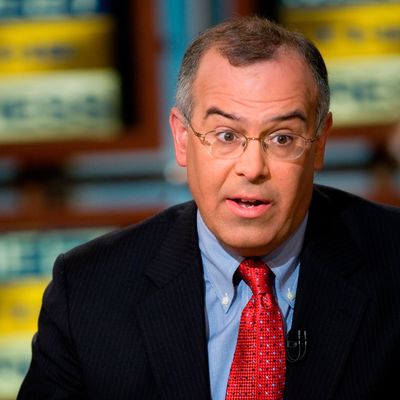
The trouble with moderate Republicans isn’t that they have terrible ideas about what government should do; it’s that they can’t seem to acknowledge the reality of what the two parties actually stand for. Two of the more prominent moderate Republicans, David Brooks and Michael Gerson, today offer up useful displays of the crippling denial that afflicts them.
Brooks devotes his column to a sensible, if utterly vague, definition of moderation. He then goes off the rails when he tries to argue that both parties have forsaken it:
For a certain sort of conservative, tax cuts and smaller government are always the answer, no matter what the situation. For a certain sort of liberal, tax increases for the rich and more government programs are always the answer.
It is true that, after Ronald Reagan enacted a huge, regressive tax cut and ushered in massive deficits, liberals favored an increase in taxes on the rich to help close the deficit. But after Bill Clinton passed that tax hike on the rich in 1993, they stopped trying to increase taxes on the rich. In fact, Clinton (unwisely) agreed to cut taxes on the rich 1997, in return for a new children’s health-care program.
Republicans, on the other hand, insisted we needed a big tax cut in 2001, despite no evidence that Clinton’s tax hike had discouraged innovation or productivity. After they passed it, they then used their win in the 2002 midterm elections to pass another, even more regressive tax cut. And then, despite no evidence that these policies succeeded in any way, and in the face of the total collapse of the fiscal justifications used to sell them, they just kept pushing for more tax cuts and continue pushing to this day.
I suppose you could argue that Brooks was only describing “a certain sort of liberal” and “a certain sort of conservative.” Probably some liberal somewhere still wanted more tax hikes on the rich after 1993. But the “certain sort of conservative” Brooks describes is, you know, the entire Republican party.
Meanwhile, Gerson tries yet again to reconcile his deep affection for Paul Ryan with his abhorrence of Paul Ryan’s Ayn Randian–inspired ideology. (Gerson helped formulate the “compassionate conservative” theme and naturally despises Rand). Gerson seizes on the occasion of Paul Ryan’s speech about poverty to delude himself that Ryan shares some approximation of his own thinking.
Gerson, hilariously, swats aside Ryan’s Randianism by calling it “an embarrassing past flirtation.” Past? How past? Well, way back in 2005, Ryan called Rand “the reason I got involved in public service,” the continued inspiration for his career, and boasted that her work was “required reading” for his staff. In 2009, he praised her as a prophet:
Rand has since become politically embarrassing, forcing Ryan to distance himself. But he has done so carefully, renouncing her atheism without renouncing her moral teachings about capitalism, which of course is where she has influenced him.
Having dispatched the pesky problem of Ryan’s entire philosophical worldview, Gerson turns to his poverty speech. He praises Ryan fulsomely for saying that he wishes the poor well. Near the end of his column, Gerson arrives at this comic footnote:
The speech had gaps. I would have preferred a more specific assurance that government retrenchment will not come at the expense of the poor and vulnerable.
He wants a specific assurance that Ryan doesn’t plan to roll back government at the expense of the poor and vulnerable? We already have a specific, written assurance that it will come at the expense of the poor and vulnerable. That assurance is called “the Ryan plan.” It details absolutely enormous cuts to programs for the poor. And it’s not like Ryan was backing away from those cuts in his speech. The Ryan poverty speech was about how throwing poor people off their government-funded nutritional assistance and health care would force them off their lazy butts and make them go get a job, plus private charity something something.
It is remarkable how Republicans have managed to hold together a coalition of not only voters but leading public intellectuals who simply refuse to face up to what their party actually stands for.






























